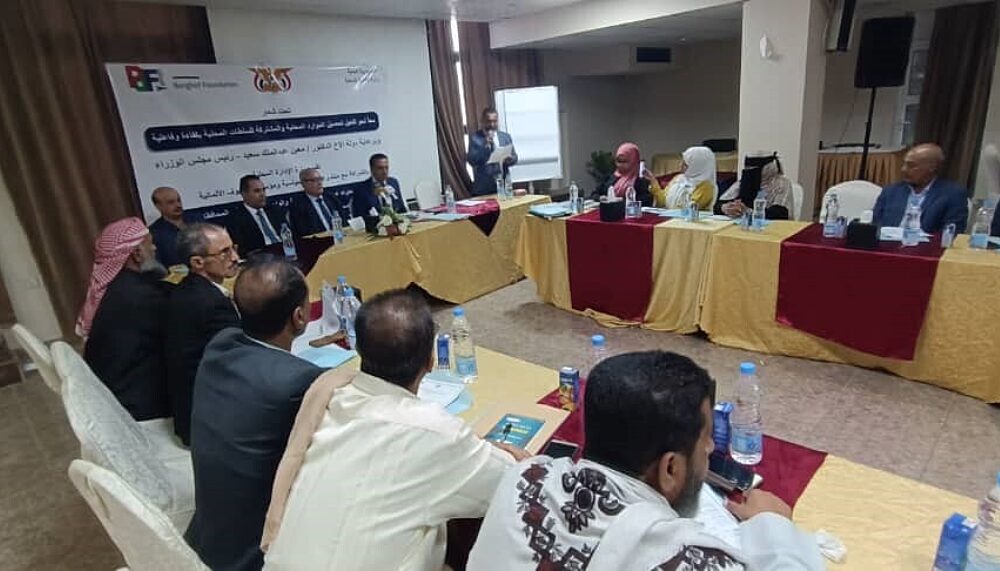BLOG POST | 21 Dec 2022
How to respond to local needs during war:
An example from Yemen

For the first time in years, representatives of local authorities from several Yemeni governorates met to discuss how they can improve their response to local needs.
By Hasan Shujaa
In Yemen, war has disrupted basic services, such as access to healthcare, education, and water. Local institutions responsible for service delivery face acute budgeting shortfalls and a fragmented political landscape. Meanwhile, central institutions struggle to cope with local needs and to coordinate an effective response. However, there are signs of progress: With the formation of the Presidential Leadership Council in April, institutions are focusing more on improving government services and the revenues needed to deliver them.
To use this momentum and to address some of the challenges in service delivery, directors of financial and zakat authorities from governorates under the internationally recognised government met in the city of Aden. The meeting is part of the joint effort of the Political Development Forum (PDF) and the Berghof Foundation to strengthen inclusive local governance in Yemen, funded by the German Federal Foreign Office.
This was the first time since Aden was declared the temporary capital of Yemen in 2015 that officials came together in a meeting like this. Participants sought to identify ways to further increase revenues from local and joint resources, such as local taxes, fees for local services, or zakat – an obligatory charity contribution by eligible Muslims to support the poor – while highlighting that in the first half of this year, revenue collection had already increased by over 30 percent compared to 2021.
Despite these improvements, one key challenge to collecting local revenues is the growing number of collection agencies in the governorates that do not deposit the collected revenues to the agreed-upon government accounts. This problem is exacerbated by freezes on hiring new government employees, which leave local revenue departments no choice but to depend on contractors. Another challenge that was identified relates to the fees collected, often incorrectly, by various security units that did not receive proper training or have the mandate to do so. Participants underlined the need to unify all of these security services and to put them under government control in order to protect the taxpayers and ensure effective revenue collection.
Another key challenge relates to the erosion of income from fixed fees. There are more than fifty types of such fees, like fees for business permits or for street cleaning services, many of which have not been adjusted since 2001 despite high inflation and a deteriorating exchange rate for the Yemeni Riyal. The Ministry of Local Administration had already submitted proposals for fee adjustments to the cabinet in 2021. However, the Yemeni cabinet decided not to increase fees in order not to overburden citizens, who struggle with a cost of living crisis.
Participants at the meeting also stressed the need to improve communication between the Ministry of Local Administration in Aden and authorities in governorates and districts. They have strong hopes that through periodic meetings the information gap between the ministry and the local authorities can be bridged. Finally, they highlighted the legal confusion that exists around local governance, as Yemen’s local authority law contradicts other legislation of the ministries.
The meeting was an urgent necessity that we had called for years. The discussion throughout the meeting helped us to achieve agreed-upon actions for the challenges that we identified, and we hope to have more dialogues like this in the future.
A participant at the workshop in Aden
At the workshop, a range of recommendations building on the identified challenges, and on recommendations developed in previous meetings that were held in Addis Ababa and Berlin as part of PDF and Berghof’s local governance work, were identified. The Ministry of Local Administration intends to submit the recommendations proposed in this meeting to the cabinet through policy papers for their consideration.
Attempts to support local governance in Yemen remain urgent, especially for citizens who rely heavily on local authorities to provide services and address local issues. However, local authorities are overwhelmed by the reality of the war, which has rendered the Yemeni government incapable of filling the needs and requirements of the local authorities to deliver effectively. This pressing situation creates an opportunity for international development partners to prevent the erosion of local authorities by continuing to build human and technical capacities, and by fostering coordination and dialogue at the central and local levels between international actors and local authorities.
The Berghof Foundation and the Political Development Forum remain committed to strengthen local governance and increase coordination between the national and governate levels.
Hasan Shujaa manages the project “Strengthening inclusive local governance and peacebuilding” at the Political Development Forum in Yemen.
The full workshop report can be made available upon request. Please contact PDF Yemen here.
Media contact
You can reach the press team at:
+49 (0) 177 7052758
email hidden; JavaScript is required


